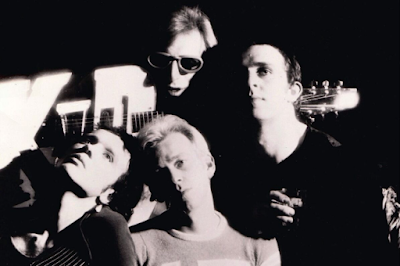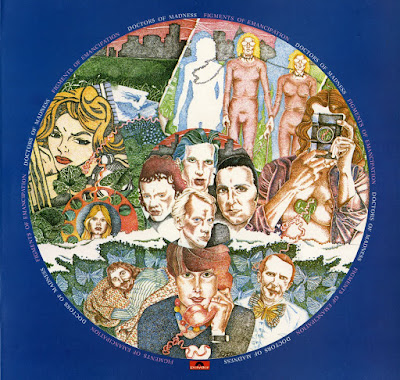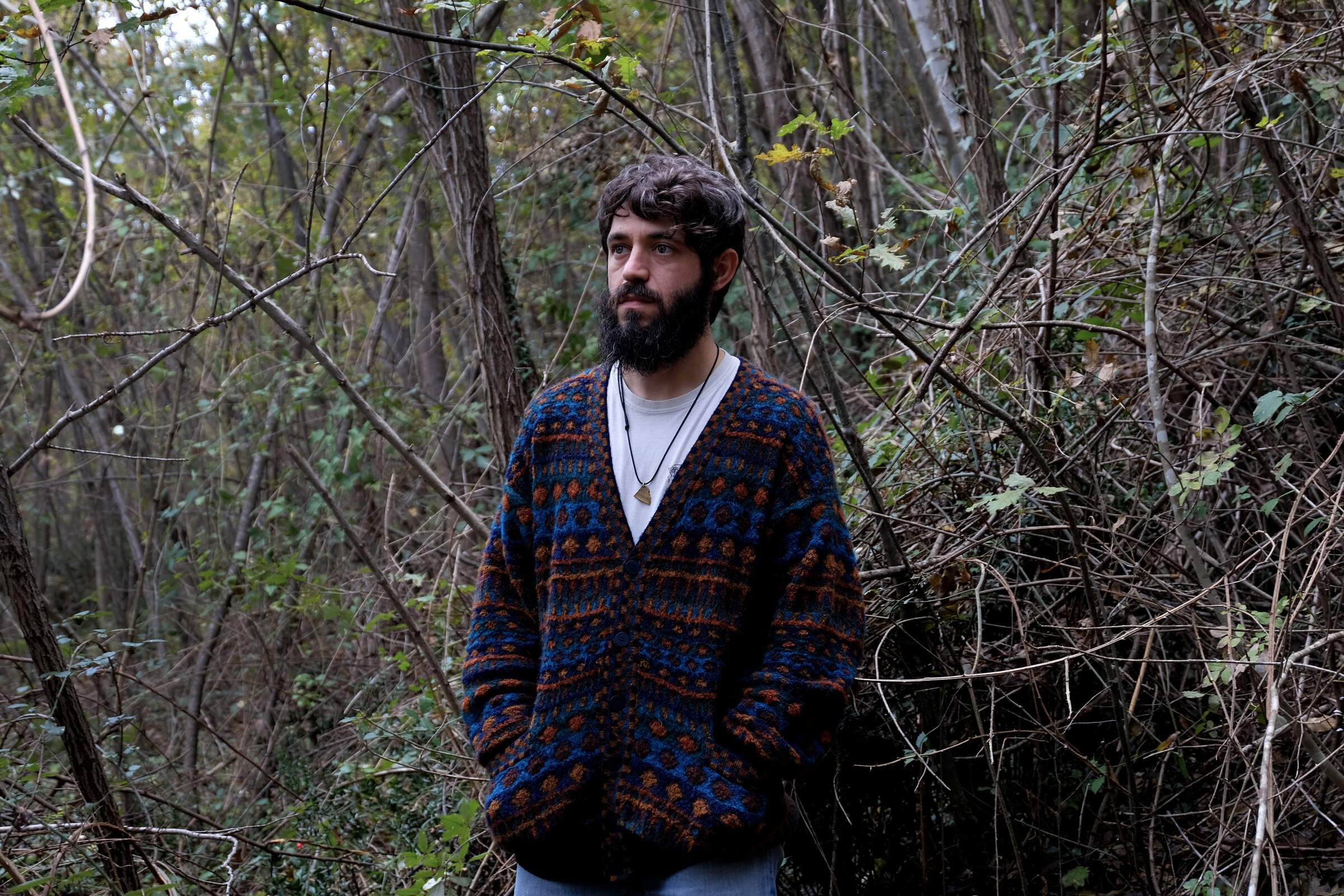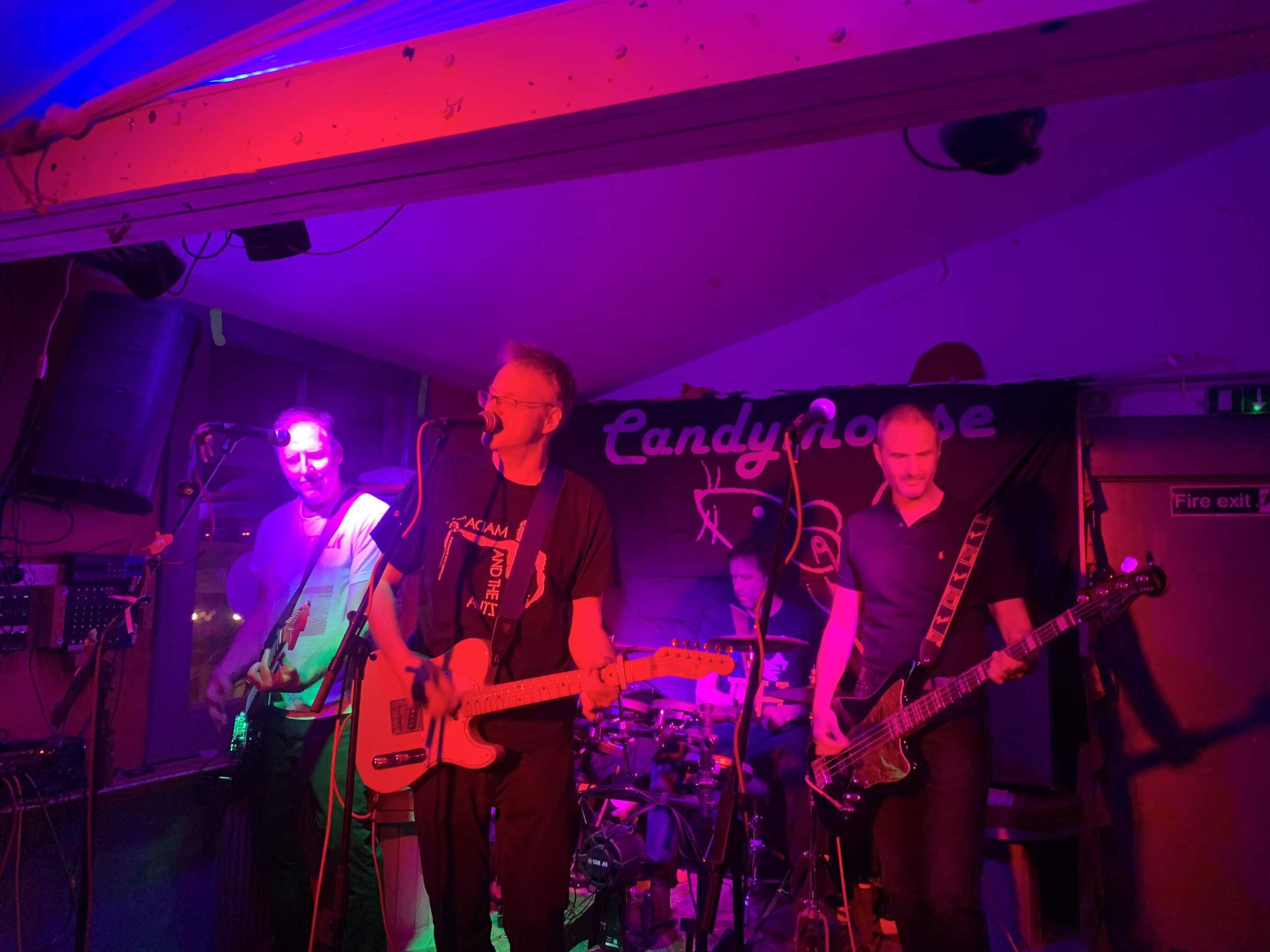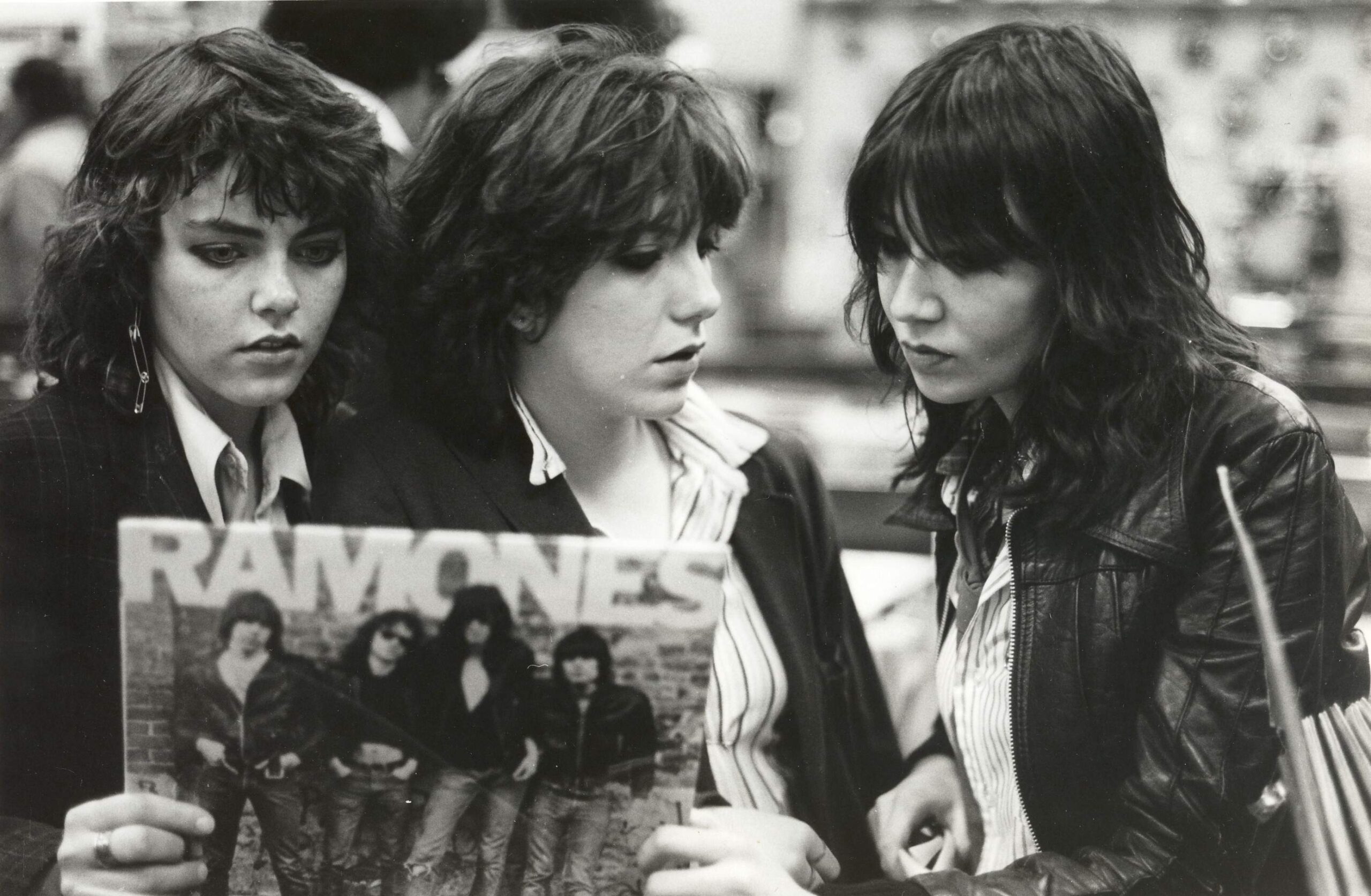Doctors Of Madness interview with Richard Strange
Recently, guitarist/vocalist/songwriter Richard Strange of the 1970s UK band the Doctors Of Madness shared his memories of the band and its place in annals of rock and roll history for It’s Psychedelic Baby Magazine readers.
Where and when did you grow up? What part did music play in your early family life?
Richard Strange: Grew up in Tooting and Brixton, South London in the 50s and 60s Youngest of 3 boys. Lower middle class family. State school – Tulse Hill Comprehensive. My oldest brother loved skiffle and rock and roll, so we heard Presley, Little Richard, Johnny Ray, Gene Vincent, Eddie Cochrane and Lonnie Donegan. Also heard Trad Jazz. For my middle brother and me though, it was all about pop/rock///The Beatles, Stones, Animals, The Who, The Yardbirds, then Bob Dylan and BOOM!
What was the music scene like where you grew up? How much of an influence did it have on you and your music?
RS: There were a couple of youth clubs where we would go and watch live bands do covers of R’n’B and Blues standards – Chuck Berry, Howlin’ Wolf, Sonny Boy Williamson, Bo Diddley, John Lee Hooker. Love that music! Then occasionally a package tour would come to Tooting Granada – crazy eclectic bills – The Stones, the Ronettes and Bo Diddley together once, Scott Walker, Jimi Hendrix, Cat Stevens and Engelbert Humperdinck all on the same bill another time! Remember a massive influence was seeing the Kinks at Streatham Ice Rink just as You Really Got Me hit Number One. Mindblowing!! Never occurred to me at that time I might want to make a similar racket!
When did you begin playing music? Who were your earliest influences?
RS: I was at school. I had discovered Dylan and The Velvet Underground and Ginsberg, Burroughs and The Beats…and contemporary art! Warhol, Raushenberg, Bacon and Richard Hamilton. Everyone else was doing it and I thought “why not me”?
What was your first band? How did it come together and what part did you play in it?
RS: I have only ever fronted the bands I have been in. I was, and still am, a pretty ordinary guitarist and singer. No-one would have me in their bands, so had to start my own! It’s always been about the songs…the words…the attitude
When and how did the Doctors Of Madness come to be formed and how did the band get its name Who were the members of the band and what instruments did they play? What kind of gear did the band use?
RS: Doctors of Madness was a William Burroughs kind of name – I always thought of Dr Benway in Naked Lunch. We started with guitars, keyboards, bass and drums. Lost the keys, went through a few guitarists, dabbled with a synth, found Urban Blitz and BOOM… found our sound!
Describe, if you would, a typical Doctors Of Madness gig? With names like Urban Blitz and Stoner, I must admit you have piqued my interest. Also, I’ve heard of blue hair and bright sideburns, how did that come about? How large a part did the stage show play in a Doctors Of Madness concert?
RS: We were very theatrical…came on to an intro tape of Burroughs reading from Naked Lunch, blue hair, shades, feedback, lots of taunting the audience, lots of sound effects being spun into our sound from the mixing desk, explosions on stage, smoke-bombs, strobes, I think I was put into a strait jacket at one point! It was fucking Wagner, man!
Who were the band’s major influences? How would you describe the band’s sound?
RS: Major influences were Velvets, Burroughs, Jacques Brel, Bowie, Dylan lyrics. The sound was very angular, abrasive, vast – we always reminded each other “We are building vast cathedrals of sound”!
When and where was the band’s first gig? How did the band go down with the audience?
RS: First gig was a student union somewhere. We died because you couldn’t dance to us! We realized we were going to have to take things into our own hands.
Did the band have a manager at this point? How did you book gigs and what sorts of venues were you playing?
RS: We arranged our own gigs up until then – we didn’t have a manager, an agent or a record company. Gigs were very thin on the ground.
In early 1975 the band took a six-week residency at The Cabbage Patch in Twickenham? How did the band get the gig and how were you received by the audience? What affect did this residency have on the future of the Doctors Of Madness?
RS: We couldn’t get booked because we were so hard to categorize, so we booked our own season in a pub called The Cabbage Patch in Twickenham when we felt we were ready to unleash the beast! Found a pub with a room upstairs with a stage that was empty on a Sunday. I brazenly told the landlord we would fill the place (to be honest, I didn’t have a clue if a single soul would come!) “Give us a month of Sundays” I said…. And he did. First show 15 people came…then 30, the 60 the 150 and we tore the place up. We opened with a song called “Pig Face and The Shiny Gang” a dystopian Burroughs-ian dirge! That tells you how close to a boy band we were! The crowd went crazy and it just so happened that Bryan Morrison was there. Morrison (Pink Floyd/Pretty Things/T Rex/ Bee Gees) had been a seminal manager/Music publisher in the 60s/70s and made his money and retired, but got bored and wanted to get back into the business. Someone had seen us the previous week and tipped him off to come and see us. He offered us a contract the next day, put us into a rehearsal room in Charing Cross for 6 weeks solid and said…”Don’t come out till you have your show, your look, your songs, your ideas for lights and staging sorted”. Then he invited top record company execs like Clive Davis and Ahmet Ertegun to come and see us do 3 or 4 numbers in that room.
In September, 1975, the band signed a recording contract with Polydor Records. Did other labels show interest in signing the band? Why did you choose Polydor and what were the terms of the contract?
RS: I think Polydor offered the most money, didn’t insist on signing us for the USA, but were strong in Europe.
When did the Doctors Of Madness begin recording? What studio did you use and who was the producer? What songs were recorded and how satisfied were you with the results of the sessions? Were they all original compositions or did you do any covers tunes? Do you recall the first tune recorded? How many of these songs made it onto your debut album “Late Night Movies, All Night Brainstorms?”
RS: Here’s what I wrote about those sessions in my memoir, Strange – Punks and Drunks and Flicks and Kicks. (2004)
“The unique sound of the Doctors really came jointly from the musicianship Stoner and Urban Blitz. Peter and I were just about competent and adequate musicians, but the racket that those two guys made was what made our sound. As a vocalist I knew I was no great shakes, my range is too limited, but as a performer who could put over those songs I’m pretty good. I work within my limitations, but always try to push myself to expand them.”
(In Majestic Studios, Clapham, London, recording our first album…chosen because it was cheap and Eno had recorded Here Come The Warm Jets there) With the early technical problems overcome, we set about our task of recording a great first album with a genuine relish and a manic intensity. I wanted to make an album that would contain, reflect and mutate everything I had ever felt, ever experienced in my 24 years. I wanted it to reflect every joy, every disappointment, every grudge, and every resentment. I wanted it to be full of bitterness, desolation, alienation, bile and fury. Such tenderness as there was would be tempered with cynicism and distance. Such romance as there was would be doomed to painful breakdown. I wanted the record to be dark, cinematic and colossal. My subject matter was urban decay, neurosis and corruption. I had the anarchist’s loathing for all systems of control. Lyrically my roots were in the singer/songwriter tradition of Bob Dylan, Leonard Cohen, Jacques Brel and David Bowie, but my songs were seasoned with a sour edge and a rotten middle, courtesy of William Burroughs. Musically I loved the energy, directness and gonzo avant gardism of the Velvet Underground at their most uncompromising. Walls of white noise and feedback laid over speed-fuelled, dumb-ass rhythm. The harmonic equivalent of bare-knuckle fighting. Sonic porn. We set ourselves into a circle in the studio, turned down the lights and attempted to blow each other off the face of the earth. John Punter produced. We recorded several versions of each song, changing our performances each time. All the tracks were recorded live in the studio, with any overdubs and corrections done later. It meant that the album was hell to mix, because there was so much sound spillage. For instance, the drum microphones were picking up the sounds of the guitar, the violin and the bass, so it was impossible to alter the sound of the drums without also altering the sound of the other instruments. But what the songs lost in clarity and definition of sound, we felt they gained in spirit and atmosphere. I don’t remember the first song we recorded, but it might have been Doctors of Madness, ironically the only song that didn’t make it onto the finished record. We rerecorded it with John Leckie for the second album. All the compositions were mine.
In late October, 1975, the band undertook its first UK tour. How many dates did you play and what sorts of venues did you appear at? Who were some of the bands you shared the stage with on this tour?
RS: We played about 60 shows, many with Be Bop Deluxe, at the biggest venues in the country- Manchester Free Trade Hall, Bristol Colston Hall, Leeds University etc… but filled in gaps in the tour schedule with smaller gigs on our own in clubs and colleges up and down the country. We slept on our tour bus in laybys and car parks – it was the middle of winter. Oh! The glamour of life on the road! We also played with The Heavy Metal Kids, Edgar Broughton, Sutherland Bothers, a real mish mash – as I said there was no-one quite like us so we got tagged onto the most unlikely acts bill! In Germany we played with AC/DC and John McLaughlin, then at Olympia with Black Sabbath! Ouch!
When “Late Night Movies” was released in March, 1976, what sort of reviews did it get? How pleased was the band with the album? How were sales? Why was no single released to help publicize the LP? The album contains the 16 minute, hard rocking magnum opus “Mainlines.” What was the inspiration for this number which features incredible guitar work, and gorgeous electric violin and driving drums.
RS: We got really mixed reviews for the album…some journalists got it, some really didn’t! We were thrilled with it though… “Cathedrals of sound!!” we kept saying…There was nothing to compare it to really – remember this was BEFORE new wave, art rock and punk rock! Bowie and Roxy Music were the nearest comparisons but were weren’t really THAT either! We didn’t have a suitable single…and we didn’t really care – we were very much an albums band! “Mainlines” was a massive undertaking… a song that went through about five separate sections over 16 minutes. When we played it well it was a colossus, an irresistible journey to the end of the night.. Very Louis Ferdinand Celine! Again, William Burroughs’s fingerprints can be found at the scene of that particular crime! “Reversal Boys with cans of dogmeat…heavy breathing in the back street…etc”. Nott your conventional love song!
The album was not released in the United States or Canada. Why not? What affect do you believe this had on record sales? Was it a major concern for the band at the time?
RS: There was a rather disastrous NBC documentary about us made for US TV which was a long way from complimentary… if you think the British press were mixed about us, you can imagine how the mainstream US media were about us. We weren’t exactly the Eagles, Bon Jovi or ZZ Top!! Our first two albums were eventually repackaged in the States as a double LP… we had out fans – but not many!
In May, 1976, you began recording your second album. What studio did you use and who was the producer? How did the sound differ from the debut album? Would you share some recollections of the sessions?
RS: We went into Abbey Road with John Leckie producing – I had known him since he engineered Roy Harper’s records, Roy had been a good friend of mine in the late 60s, early 70s. We were the first band John produced, though of course he went on to do many huge acts – Radiohead, Stone Roses and many others. John brought a sophistication and a great deal of technical know-how to Figments of Emancipation, which, married to the competence and confidence a year on the road performing live to big audiences had given us, resulted in a coherent, varied and highly textured record. I remember wanting female backing singers on Suicide City and Perfect Past and I asked him if he could get Clare Torry, whose amazing vocal improvisations had made Pink Floyd’s Great Gig In The Sky so unforgettable, and the next day – she was there in the studio – ready to go! I remember playing a lot more electric guitar on that record too – solos on Suicide City, Out and In Camera we real departures for me. In the middle of the sessions my son Eugene was born. My manager was furious…the studio cost £120 an hour and I was at the hospital for 6 hours while Rene gave birth!
How pleased were you with “Figments Of Emancipation?” What were your favorite tunes from the album? How did sales compare with those of your debut LP? How much support did you receive from your label?
RS: I remember hearing some of those songs back for the first time and being immensely proud- Marie and Joe, Suicide City and Perfect Past all sounded colossal. We had also really pushed our studio technique to use backward loops, phasing, sound effects and backing vocals. The album sold well, the record company was happy.
Early 1977 found the band touring once again. What nations did you visit?
RS: We were on the road playing to 600, 1000 people a night at Universities and concert halls, and touring Europe too. France, Belgium, Holland, Germany, Denmark, Sweden, Switzerland. Life was good, though I missed my new born son, of course. What could possibly go wrong….??!!!
In August, 1977, your first single was released, featuring the non-LP side “Bulletin” c/w “Waiting,” the latter taken from your debut album. Did the single receive much airplay and if so, where? How were sales and what did Polydor do to help promote the single?
RS: Sales were poor and radio plays were really poor. The trouble was, we were being marketed as a punk band by Polydor, although we really weren’t. We had masses in common with many if those bands, and many were fans of ours – The Damned, the Adverts, the Skids, Penetration… And many supported us – the Sex Pistols, Joy Division and The Jam, to name a few, but we were so much more complex than Punk Rock… and we were, crucially, three years older! That’s a generation in Pop Music terms! Polydor were already signing a whole raft of generic no-hopers, when they should have been nurturing something original and innovative – but that’s life!
When and where was the band’s final LP “Sons Of Survival” recorded? Whose idea was it for the band to self-produce the album? Describe, if you would, the sessions and how pleased you were with the results. How had the band’s sound evolved?
RS: The third album Sons of Survival was kinda sad because I knew by then that we were all over, it was going to be our last record, and the songs had either a political anger to them, like Triple Vision, Bulletin and Sons Of Survival, or they formed an elegiac farewell, like Kiss Goodbye Tomorrow and Network. We self-produced partly to save money, partly because we had developed a bit of a siege mentality – it was us against the record company and the music business by now! I like many of the songs on the record – but the sound is rather desolate – a busted, blasted landscape that ends with a howl of feedback at the end of Cool like looking down on a war zone!
In January, 1978, Urban Blitz departed and the band was now a trio. What affect did his absence have on the band’s mood and sound? How was this accepted by fans of the Doctors Of Madness?
RS: We were a bit all over the place then to be honest. Resentful, jealous, scared, we lost focus because we knew that part of the adventure had now been played out and was over. We played Berlin a few times, some French shows, some UK shows- but we were fractured, wounded and a bit lost.
When did David Vanian of The Damned become involved with the band? What was his role in the Doctors? Why was the single recorded with him, “Don’t Panic England” never released?
RS: Dave joined because he was falling out of love with the Damned and he had always loved the Doctors he often joined us on stage for impromptu duets with me on his favourite Doctors songs…he would just climb onstage and grab a mic! The crowds loved it! I joined the Damned for a day, too! I like Don’t Panic England. I wrote it with TV Smith form the Adverts and we recorded it at Polydor in a few hours one night. Dave sang lead, I did backing vocals and guitar. It was never released until this boxed set came out. A lost gem!
What were the final months of the band’s life like? How was the band’s morale? Were any attempts made to make the band a quartet again?
RS: We were like a balloon with a slow puncture. The only way was down! Morale was not great, and no attempts were made to reunite or recruit.
The Doctors final gig was 26 October, 1978, at Camden’s Music Machine and was billed fittingly as the “Last Ever Concert by the Doctors Of Madness.” How did the gig go down? What were your feelings about the band at this point? Do you recall the opening and closing numbers from that final gig?
RS: It was a bit of a relief, acknowledging that it was over and calling it a day. Having a Farewell Concert rather than just letting things slowly disintegrate. We opened with a blistering wall of feedback that went into a new sing called Trouble. Played every favourite from all three records. We played a few songs with TV Smith. Played Velvet Underground’s What Goes On? and finished with Waiting For The Man.
Looking back, what would you describe as the highest and lowest points of your tenure in the Doctors Of Madness? What acts did you enjoy sharing the stage with the most? What was the largest crowd the band played to? What are your favorite songs by the band?
RS: The high point was changing the way I saw my own life – growing up if you like, and growing in confidence. I knew I was an artist, a good writer, a compelling front man, an ideas guy who could make things happen. I always enjoyed working with BeBop Deluxe and Bill Nelson…we were both Jean Cocteau fans and Burroughs fans. Penetration were great to watch – and so were the Adverts. We played festivals to 30000 and we played tiny clubs. And everything in between! I like so many of the songs we recorded… I guess the essentials are Mainlines, Marie and Joe, Suicide City, Sons Of Survival, Mitzi’s Cure… In retrospect if the Doctors had had a hit record we would probably have got trapped, like so many bands, into rehashing and regurgitating the same material for 30 years – I might never have worked with Tim Burton, Jack Nicholson, Harmony Korine, Tom Waits, Robert Wilson or Damon Albarn. Never have been an actor, a curator, a teacher, a writer… Oh and without the Doctors, there would have been no Damned, no Pulp, no Simple Minds!
Following the breakup of the band, you did more recordings, wrote your autobiography, ran the Cabaret Future and worked as an actor. Would you share some recollections of these many varied projects? Which were the most enjoyable?
RS: After the Doctors I wrote a political fantasy album called The Phenomenal Rise of Richard Strange in which a shyster uses his personal wealth and understanding of showbiz and advertising and the gullibility of people to become president!! Imagine that ever happening in the real world (ha ha)!!!! Then I opened a European style mixed-media Cabaret (Cabaret Futura- still going strong after 37 years! We featured the first gigs by Depeche Mode, Soft Cell, The Pogues…) Then I wrote world music like Damascus and Lowlife and God Help The Wealthy Man just before world music happened. A chance meeting at a dinner with a publisher led to me writing a memoir. Originally, he asked if I could write 5000 words about the 70s… I ended up writing about my first 50 years… as I was writing I realized what an amazing and probably unique life I have been lucky enough to lead. Who else has kickstarted a musical trend, appeared in films with Jack Nicholson and on stage in Hamlet with James Nesbitt, opened a Cabaret Club, worked with Martin Scorsese, written an opera with Gavin Bryars, been friends with Damien Hirst and Marianne Faithfull, worked with Tom Waits and Robert Wilson, and NEVER been to art school or university, just a South London comprehensive?
What is Richard Strange up to these days? Are you still involved in the music industry? How does it feel to have Cherry Red Records’ RPM Records imprint reissue the complete recordings of The Doctors in the upcoming 3 CD box set “Perfect Past: The Complete Doctors Of Madness?”
RS: Now I am touring with the Doctors for the first time in the UK since 1978. Jason call us back in September. I have a potentially MASSIVE Doctors-related project on offer, plus the completion of the film of the William Burroughs event I curated at The Queen Elizabeth Hall, London in 2014. I am a teacher, a curator, a writer, an actor and a grandfather! I have a fabulous wife, 4 great kids and we loved to travel and we love seeing art shows, performances, theatre and friends… I keep busy and stay out of trouble (mostly!).
One last question, one of the bonus tracks on the set is “William Burroughs Intro Tape” which serves as a band introduction on the “Last Ever Concert by The Doctors Of Madness.” Was Burroughs the biggest influence on the Doctors? Would you explain the depth and breadth of Burroughs’ influence on the band?
RS: How long do we have??!! Burroughs got me into writing when I was 15… and that in turn got me into the Velvet Underground, Warhol and Contemporary Art. He revolutionized the process of writing with his cutup method. His subject matter…lowlife, drugs, science fiction and political and psychological control are endlessly fascinating, he has an original take on time…and he is also SO FUNNY. He shone a light into the human condition that most songwriters had not considered or even been aware of.
Okay, I’ve had my say. Is there anything regarding your time in the Doctors Of Madness, or any other topic, that has not been covered that you would like to share with It’s Psychedelic Baby Magazine readers?
RS: Working with students all over the world, as a teacher, tutor, mentor and inspiratory, has been incredibly rewarding. I try to give my students the courage to fail – because without daring to fail you will NEVER create original work. If I hadn’t “failed” as a rock star I would not have had a tenth of the life that I have had!
Thank you so much for taking the time to take this trip down memory lane and for sharing your memories with our readers. Having listened to the box set, due for 5 May release, I would like to personally thank you for all the wonderful music and to let you know I greatly enjoyed it. Congratulations on the well deserved recognition and take good care!
RS: How generous you are. In a single paragraph you have validated part of my lifetimes work! Thank YOU!!
http://www.richardstrange.com/
https://www.cherryred.co.uk/
– Kevin Rathert
© Copyright http://www.psychedelicbabymag.com/2017
Array

